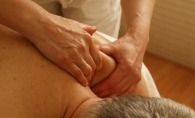According to Dr. Conrad Iber, medical director for Fairview Sleep Centers in Edina, around 30 percent of the U.S. population suffers from lack of sleep. For most people, getting better sleep is relatively easy, but for others, more intensive therapy is needed. Whatever the case may be, doctors at Fairview have the tips and expertise to help anyone sleep through the night.
Keep it simple
For most people, feeling well-rested is all about getting into a routine. Our circadian rhythm—our internal “clock”—is designed to keep us asleep at night and awake during the day. When that clock gets out of whack, odds are slim you will wake up feeling refreshed. Unfortunately, this is a common problem.
“Our culture tends to be bad sleepers,” says Dr. Michael Howell, a neurologist and sleep medicine doctor at Fairview Sleep Centers. “If you woke up with an alarm clock today, you are by definition sleep deprived.” This may sound crazy to the millions of Americans who get up at 6 a.m. for work and barely have enough time in the day to make dinner, clean the house or—crazy enough—have a few minutes of free time before bed, but it’s true.
Fortunately, the fix can be as simple as finding your sleep schedule. And everyone’s is different. Some people are naturally programmed to go to bed early and wake up early. Others, not so much.
“There is the coaching part to sleep,” Iber says. “This means working with people on a sleep schedule and what timing works best.” Implementing this can be a Catch-22, as it often entails modifying a patient’s work schedule, which requires employers to get on board with different work hours, all in the name of better sleep. It’s a solution that often proves impossible.
For people who don’t have a flexible work schedule, it becomes all about a routine. Both Howell and Iber recommend an hour or two of wind-down time before going to sleep to get your body ready for bed. This means shutting off electronics and doing something relaxing like reading a book (or maybe Edina Magazine).
With so many products boasting solutions to sleep problems, it’s hard to believe the solution could be as simple as sticking to a schedule. “When I see [advertised sleep aids] I think, ‘My goodness, there is a huge market for these things because there are so many people struggling to sleep,’ ” Howell says. While he doesn’t discourage people from using some sleep-aid products, many have unproven effectiveness, and usually the best way to truly keep yourself on track is to let your body find its natural sleep schedule.
Common sleep disorders
Beyond the general restlessness we all feel from time to time, sleep disorders are fairly widespread. Iber estimates that insomnia, sleep apnea, and restless leg syndrome affect approximately 5 to 30 percent of the population. These numbers may seem low, but taken together, they account for upward of 140 million Americans who are afflicted with some type of sleep disorder.
Sleep apnea is in some ways the poster child for sleep disorders. It involves pauses in breathing or shallow breathing that disrupt sleep. It is treatable, but if left untreated, it can be fatal in the most severe cases. Overweight men and post-menopausal woman are most at risk. A spouse is most likely to notice a sleep apnea problem when a bedmate is gasping or breathing irregularly during the night. Odds are high that person suffers from sleep apnea and should be encouraged to seek treatment. Snoring can also be an indicator of sleep apnea, but Howell estimates 50 percent of the population snores, so snoring alone doesn’t define sleep apnea.
While the warning signs of sleep apnea are more obvious, issues like insomnia and restless leg syndrome can be harder to pinpoint. Restless leg syndrome keeps people up with an overwhelming urge to move their legs, while insomnia is the inability to fall asleep or stay asleep. These can afflict people to varying degrees, and require a doctor to fully diagnose the scope of the problem.
Risks and treatment
Bad sleep leads to bad health. No matter what sleep disorder ails a person, anyone who isn’t getting a good night’s sleep is at a higher risk for cardiovascular disease, cancer, stroke and many other ailments, not to mention decreased performance at work or school, and general sluggishness throughout the day.
If creating a sleep schedule isn’t enough, doctors can step in and help solve more severe sleep problems. Sleep apnea is directly treatable with a continuous positive airway pressure (CPAP) mask or oral device. However, most other problems require some form of counseling with a sleep professional. “People need to talk to sleep doctors more than they need a [sleep] study,” Howell says. “Someone who will listen and get an idea of what is going on.”
“How often have you used sleep as the most dispensable item when you have work to do?” Iber asks. “We have to change the culture.” To do that, people need to become more aware of their sleep issues, and work with professionals to make proactive lifestyle changes.
Tips for Better Sleep
- Wind-down time: 1 to 2 hours of relaxation before bed
- No alcohol before bed
- Wake up to natural sunlight
- No electronics in the bedroom
- No more than three caffeinated beverages per day, and none after 3 p.m.
- Keep a consistent schedule
Self-help online from the American Academy of Sleep Medicine: sleepeducation.com









